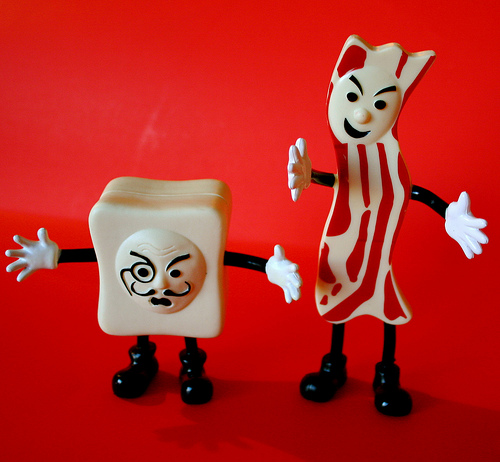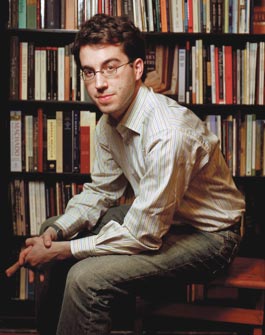
Since childhood, Jonathan Safran Foer has dabbled in vegetarianism—but when he became a father he finally decided to take a closer look at his dietary choices. The result is his first work of nonfiction, Eating Animals. Foer, author of the acclaimed novels Everything Is Illuminated and Extremely Loud and Incredibly Close, uncovers some ugly truths about America’s meat production system, but he also weaves in stories from his own family history—and shows how stories can shape our diets. While others have argued for reforming our system of factory farms, Foer argues for much more radical change: giving up meat (or at least eating dramatically less of it). I talked to him about switching from novels to nonfiction, raising kids veggie, and daring to disagree with the pope of the sustainable food movement, Michael Pollan.
Mother Jones: You’ve written only fiction before. How did the switch to nonfiction go?
Jonathan Safran Foer: Not smoothly. One of the things that I love about writing novels is that it really doesn’t matter what next step you take as long as you’re pursuing some intuition or instinct. Of course, then, intuitions or instincts don’t make for great novels, but they often make for good first drafts. And here, that was not the name of the game. There are something like 70 pages of footnotes in the book. So I did everything I possibly could to be really rigorously objective and up-to-date and conservative with the statistics because the conversation is useless if you don’t have a really firm grounding in reality. That said, there’s more to reality and the ways that we make our choices than just statistics. So there’s another kind of reporting that I did, that didn’t take place out in the world. I also reported on my own history with these things, finding out which of them were just vestiges from my childhood, which of them I had because I thought I was supposed to have them, and what it was that I actually believed when I really probed and thought about it.
MJ: Especially because, as you write in this book, the issues of food are so tied up with emotions and with stories that we learn from our families. It’s hard to think about food as just a bunch of numbers and facts.
JSF: I think that when you allow those other things, those irrational things, into the conversation, you’re not only being more honest, I think you’re actually enhancing the argument. Because of course we crave something that smells good or tastes good. But we also crave being consistent and acting on the thing that we sense is right. Of course food has an important cultural use in families, but there are things that have more important cultural uses in families, and broadening the conversation out simply from what’s reasonable also allows in those other things.
MJ: At the center of this book is the anecdote about your grandmother. Even when she was starving and on the run from the Nazis, she wouldn’t eat pork. You write at the end, If nothing matters, then there’s nothing to save. In our culture, though, one of the big problems that we have is wastefulness. Is it defensible to not eat meat even if you know that that meat is just going to be thrown away?
JSF: It takes between 6 and 26 calories to make one calorie of meat. It is an incredibly inefficient protein because we are cycling through all of these other grains that humans could eat. It’s a little bit different for grass-fed cattle because humans don’t eat grass. But they are, of all the kinds of animals we eat, those are a very rare exception. Certainly for all of the pigs and chickens and well more than 70 percent of all cattle, they’re eating food that we could eat. Eating a piece of meat, at its most efficient, we could say is like throwing away six times that amount of food every time you eat it because you’re recycling all those calories through it. I know a lot of people who came to this issue not through animal welfare but through wastefulness.
MJ: You have a whole section on PETA in your book. You acknowledge that they’re the butt of a lot of jokes. But it seems like you take them seriously. Do you ever think they undermine their own cause by being so strident?
JSF: Part of their effectiveness is in acting like jackasses sometimes. Everybody knows who they are; they have an incredibly powerful brand and they get that in part by undermining their own legitimacy. It’s like a deal they made.
MJ: You’re raising your kids vegetarian. Will it be upsetting to you if your kids decide at some point that they no longer want to be a vegetarian?
JSF: I don’t think “upsetting” is the right word. I think I would experience it as disappointing; I don’t think I would show it that way. In part because that’s a great way to encourage kids to do the opposite of what you want! But the goal is not to have them have the same values that I have. It’s to have them act on their values.
MJ: Another thing I wanted to ask you about is hunting. Do you think hunting is a more humane alternative to factory farms?
JSF: How is it humane? In a slaughterhouse they all go really quickly—hunting they don’t.
MJ: Well, it’s humane in that the animal has led a good life up until the time of death.
JSF: But that doesn’t make hunting good. It makes the fact that the animal had a good life up to that point good. And those aren’t our choices. I’d rather get lethal injection than be hanged, but actually I’d rather have neither. People often set up these false choices, these false dichotomies, and it’s not like we have to do either of them.
MJ: But some people in this country are not going to be willing to give up eating meat.
JSF: Hunting will never feed lots of people; it will always be a hobby.
MJ: You write about this great-sounding turkey operation, with these heritage birds. One of the things that makes it great is that it’s so small, and I don’t think that could ever be replicated on a large enough scale to feed everybody either.
JSF: No, it can’t, which is why we just have to move away from this stuff. I’m not sure I agree with you that it will never be the case that people won’t eat meat. I think it could conceivably be the case one day that people eat very small amounts of it. That it’s a special thing, rather than reach for it because it’s cheap or reach for it because it’s convenient, that it becomes something festive or something celebratory, once a week, and that could actually be achieved on small farms if we really changed our habits. And I’m not talking about a radical change. I’m talking about a return. We now eat 150 times as much chicken as we did 80 years ago. That’s totally insane. We don’t need it. It’s just that agribusiness realized we could raise chickens for practically nothing, realized they could feed it to us in ways that don’t require silverware, don’t require a kitchen table. So it’s not just the system of raising animals that’s changed so much as these diets that have been imposed on us, and imposed on poor people in particular. Other cultures don’t eat that way, and we have historically not eaten that way. But the scary thing is they’re starting to eat like us. There are more obese people in the world now than starving people. As China and India start to develop our eating habits—and not by accident but because agribusiness is now going over there and imposing our habits on them—if the population doesn’t increase at all, we’ll have to raise twice as many animals as we do now.
MJ: In the book, you disagree with Michael Pollan on a number of points. Has he responded?
JSF: It’s funny, I agree with him on so many more. One is allowed to disagree with someone respectfully, and I hope it was respectful. There’s nobody who’s done more for this issue than he has, and I have nothing but respect for him. It doesn’t mean I don’t disagree with him on a few points, and those points might even be important, but they’re exceedingly minor compared to our points of agreement. He really was an inspiration for the book. The point is, he’s so so smart about so so much that when he doesn’t take something to the place that it obviously should go then it’s bothersome, because he’s so thorough, because he’s so intelligent. If he were some schlub it wouldn’t matter at all.
MJ: You are almost a vegan right now, right?
JSF: That is what I am moving toward.
MJ: Drinking milk and eating eggs, even eating soy—there are problems with all those choices.
JSF: There’s an important point there: Ninety-eight percent of all the soy that’s raised goes to livestock. So people make fun of vegetarians for being tofu eaters, but no one eats tofu like steak eaters, by a long shot. It’s also funny that tofu is held up as what a vegetarian eats. I mean maybe I eat tofu once a month, but other than that, never. All of it, statistically speaking, is going to livestock.
MJ: My point is that it’s hard to make a completely blameless choice.
JSF: It’s impossible to. It’s completely impossible to. I think that people have framed this conversation in absolutes. Either you are or you aren’t. The word vegetarian, I think, does a disservice because there are a lot of people who care but maybe don’t care, or can’t care in an ultimate way. If you think about environmentalism, nobody would ask, “Are you an environmentalist or not?” The question doesn’t make any sense. And the notion that the first time you drive in a car or fly in a plane that you should throw your hands up in the air and say, “Okay, well I give up. I’m not going to try at all anymore,” is crazy. If people thought about food more like how we think about the environment, a lot of people would be eating differently and the whole system would look a lot different.















